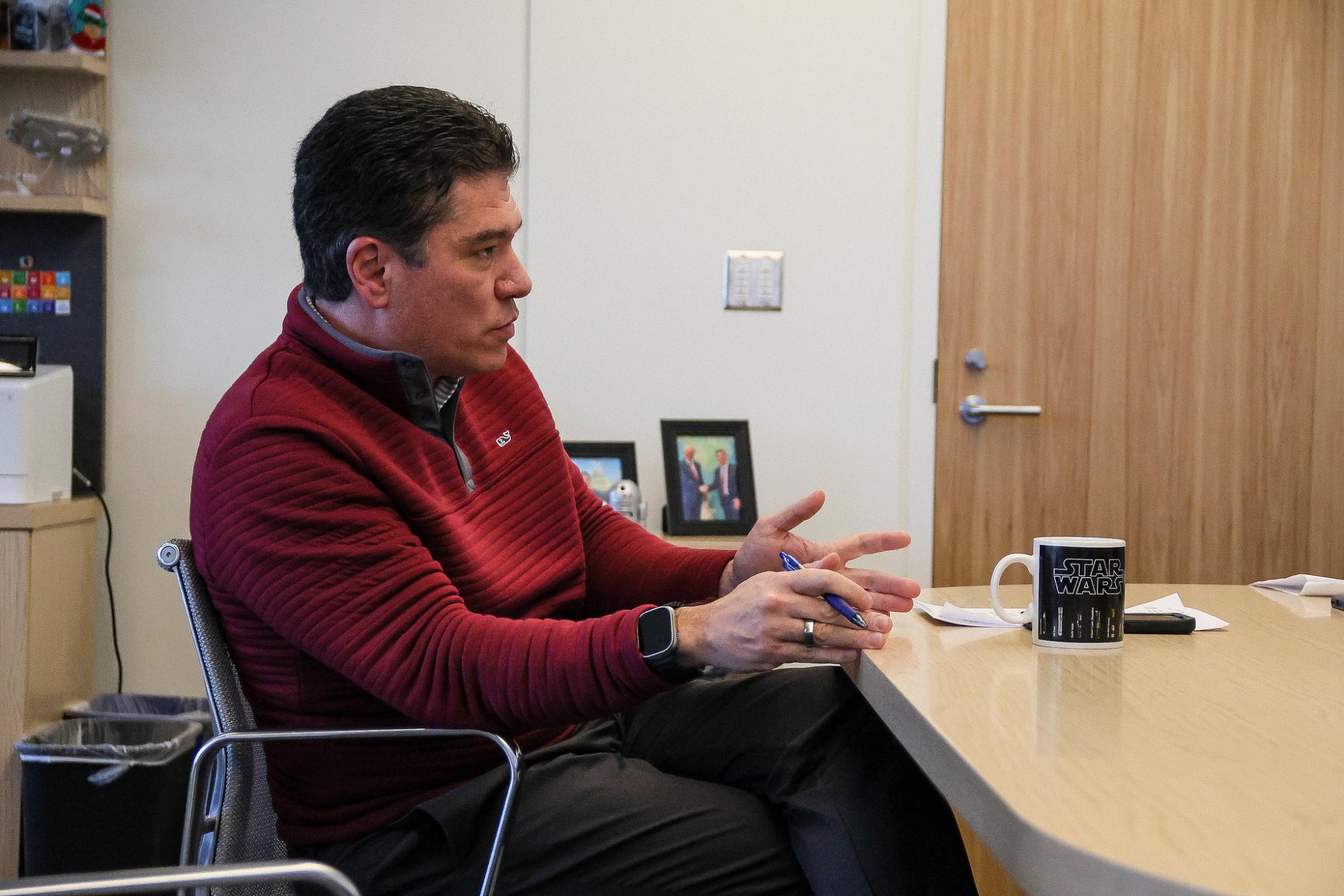On Monday, Feb. 12 Chancellor Javier Reyes sat down with the Daily Collegian to reflect on his first semester at the University of Massachusetts and detail his approach to creating affordable housing, working with unions and addressing conflict on campus.
During the hour-long conversation, Reyes spoke about his commitment to meeting with students, his leadership approach, and how he views his role as chancellor.
Note: this interview has been edited for clarity and length. Additional context is provided throughout.
A lot of students probably don’t know what you do every day. So, we were curious if you could walk us through your workday.
I would say the first thing that I try to do every morning is wake up and exercise. I try to go to the Rec Center when there’s enough time but if not, I’ll do something at the house. Then after that, I’ll have a quick breakfast … and then get to the office by 8:45 a.m.
My first meeting is with my leadership team and some of the vice chancellors like the student affairs, academic affairs, HR, government relations, public relations … [to] get a sense of what’s on the radar screen, what’s happening.
After that is meeting after meeting after meeting. If I get time to go get lunch, I’ll try to walk to another cafe, other than [the Whitmore Cafe]. I like to do that because I get to see people that I don’t otherwise get to see and I get to see students.
Today … I’m hosting a pizza dinner with a group of students. They are not [in] student government, they’re just from different parts of the campus that I met while I was walking … I get to hear things that may not be at the top of the list of student government or faculty affairs … I hear what is going on and how they’re feeling about the campus.
We actually asked on our social media account if anyone had a question for you, and one of their questions was: if we see you on campus, how should we approach you?
If you see me around campus, stop me and say hello, tell me how things are going. Sometimes I’ll say, ‘Hey, walk with me as I’m getting to the next meeting.’ Or, if I don’t have a chance to really stop and have a conversation, I’ll get their name and try to follow up. But I love to hear from students.
I have learned when you’re on the elliptical to say, ‘This is not the time for a conversation.’ So what I tell people is, put your headphones on when you’re on the elliptical and then everybody understands that you’re in your zone. Once you take the headphones off, now you’re open to conversations.
So, not on the elliptical, but any other time?
Oh, yes.
Speaking about talking to students, during your listening sessions you expressed a desire for students specifically to hold you accountable. How do you want students to go about that?
Being able to just have the conversation when I’m walking across campus … I’ve heard about food insecurity that way. I heard about the issues that we’re having with one of our residence halls with showers needing to be cleaned. So to me, that’s more than okay, just stopping, saying hello and [talking] about this issue, positive or negative.
If it’s something that requires more time, just send an email to the chancellor’s [email] account. Sometimes it’s not me that has to address it, but it does help that it was brought to my attention.
Then, [talk] to me when I’m at the basketball game. When I’m at the hockey game, stop me. That’s the best time and we were all having a great time together. It’s okay to have conversations about that then. If we’re at the theater don’t talk when the performance is going, but definitely in between.
You can’t divorce UMass from its students, but it also has a critical role in the surrounding towns and community. How do you perceive our relationships with Amherst and other surrounding towns like Hadley? How do you want to strengthen that working relationship? It has a history of being contentious at times.
Note: The Amherst Community Resources Committee has been in the process of revising the town’s rental bylaws. One of which is broadening the definition of what is considered a nuisance in the nuisance house bylaw “to include references to Massachusetts general laws relating to disorderly conduct, as well as Amherst general and zoning bylaws. The bylaw currently issues $300 fines to those who create a “public nuisance.” Another revision to the bylaw would make “it a nuisance offense to have more than four unrelated individuals living in a single-family rental unit.”
[I’m] getting to know the perspective of the community and the University. I’ve been going to the different chambers talking to different town leaders. Just getting to know them before we have something to talk about, something to resolve.
Note: Reyes said that he has met with Hadley and Amherst town officials as well as local hospitals, emergency services and fire departments.
We’re an economic engine for the community, we bring with it perhaps a big weight … all of the sudden the whole town doubles in size overnight. So it comes with its challenges. But we just have to continue to make sure that we are realizing that we’re part of a neighborhood. And just like we are close to them, they’re close to us.
And I think inviting [residents] to come and see our students…they can go to football [and] basketball, they can go to the Fine Arts Center, they can go to the dance recitals, and having them see our students at [their] best.
And yes, of course, these are 18 to 24 year olds, they will have their lives when it comes to the weekend…So, I think it’s continuing the conversation, and continuing building with a mutual respect.
The town of Amherst is exploring changing the rental bylaws to limit how many unrelated individuals could live in a rental property together. Many students live in houses with up to five, six people to make it affordable. Could you speak to that?
We have someone from our side talking to the town of Amherst.
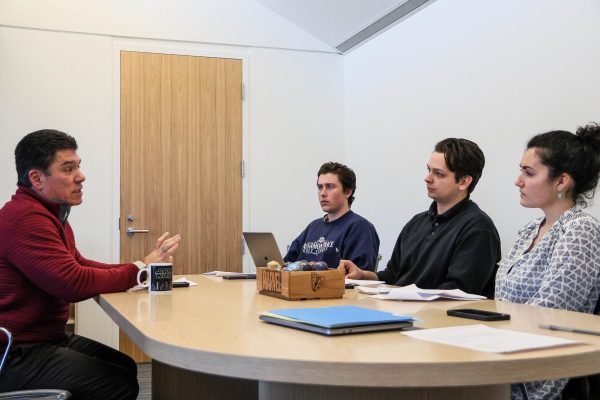
The campus has a great history of activism. I’m interested if you could walk me through how the Chancellor’s Office makes a statement about a world event or a tragedy on campus.
We assess when and how it will impact our campus and society around it. We tend to not necessarily be more present and political on statements that we have no reason to partake in. We try to always start by making sure that the students have resources because of the world event.
There’s definitely a culture of activism in Amherst and UMass Amherst that makes our campus what it has always been. And I think we will continue to ensure that we have freedom of expression, we have freedom of speech, we ensure that we have academic freedom for our faculty, these will always continue to be our northern stars. But we have to make sure that it’s not at the cost of infringing upon the rights of others, or the operations of the University, or disrupting the peace or affecting our community or endangering anyone.
So that’s where we have to make sure that we communicate with everyone who wants [to demonstrate] — whether it’s a faculty or student or staff — that we have certain expectations … and as long as those demonstrations are happening within the lines that have been set by policies, and in many cases the code of conduct, we will be able to continue to celebrate the activism.
If that activism breaks into the rights of others – [that] includes the rights of staff to work, the right of students to be in their classes, to have their lunch – that’s where we have to abide by our code of conduct, otherwise, it would be very, very problematic.
I’m sure you’re aware of the fears and safety concerns that a lot of students feel that partake in the demonstrations and protests; people have been subjected to doxxing and threats. So I was wondering how you would navigate that as a figure that many community members look to you for a response and for guidance
When they want to exercise the right to demonstrate and to be activists, let’s make sure that they understand what resources are available for them to remain safe. And activism does come with visibility on a topic that usually has different sides of the equation there. So there will be repercussions that come from social media or the media in general, they may ask those students questions, and then they would put their names out there.
[We are able] to help our students understand that their activism comes with some consequences that are not negative, they’re just the outcome of being an activist and being able to present them as such, and just stand ready to help them and protect them if things get to be threatening [to] their safety.
Note: Reyes referenced an email sent out by the Vice Chancellor for Student Affairs with resources for participating in public demonstrations and visibility on social media.
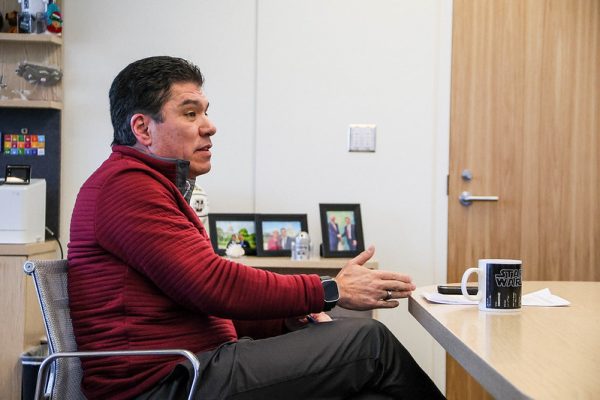
In higher education we’re seeing students saying, ‘We want Chancellor Reyes to put out a statement in support of Palestine.’ We have seen in the past when affirmative action was threatened by the Supreme Court, the University put out a statement trying to ensure that [the University] would still take a holistic approach to admissions, and that is a political statement. So in some cases, we make political statements and other cases we don’t. Could you maybe talk a little bit more about that, and specifically, its role in higher education?
I’m glad that you picked affirmative action, because although it might be seen as a political statement, it really isn’t, right? I mean, you’re looking for the interests of all students and including everyone in our mission of education. So it’s such a wide audience that you’re trying to reach out to [and] making that statement to ensure everyone hears the University’s commitment is important because it’s impacting such a large proportion of our population.
But you’re talking about the political statements, [they] should never be part of a university. [Universities are where] all views of an argument should be able to be presented, right? And we should be able to have dialogue about it and debate about it and have civil discussions about it.
Conflicts like affirmative action issues or with respect to the Palestine and Israel and Hamas conflict, you could see how many people would like to just ask the question about what’s happening to try to gain understanding. Because some people have not been following the news for the decades or centuries that this conflict has been going [on], and they feel afraid of asking about it. That should not happen at a university. A university is a place where you should be able to raise your hand without fear and say, ‘Hey, I’m trying to understand this. Can somebody help me understand why this is happening?’
You recently came from [University of Illinois Chicago]. How do you see your leadership style differing now that you’re at UMass?
My leadership style is one that I will always ask questions to teams … ‘What would you like to do?’ And that’s why we’re doing this strategic plan right now. [We are] asking the whole campus: ‘What would you do?’ The number of people I’ve met has been in some of these conversations, where they ask me, ‘Okay can you tell me what’s going to be the goal for the University now?’ And I’ve been saying until I’m done with the strategic plan and all the listening sessions, I’m not going to put a stake in the ground, because then I may be taking a misstep.
That’s part of the inclusive leadership, the listening, really making sure that it’s not about the individual, but it’s about the institution, which is what makes the job from UIC different from the job at UMass.
Note: The strategic plan is meant to outline what the next five to 10 years at UMass will look like. As part of this process, Reyes held listening sessions throughout the Fall semester with each school and college within the University, the Student Government Association and units within administration, according to an emailed update from the Strategic Planning Steering Committee.
Our campus has a very strong union presence and I’m curious about the lessons that you learned from the response that you received about your relationships with unions at UIC and your presence at the bargaining table. How do you intend to apply that at UMass?
Well, I was never at the bargaining table, because you have a bargaining team. Now that bargaining team comes back and forth and communicates with the administration. And the reason why I took that very strong stand at UIC of not being at the bargaining table [was] because I saw my role as Chancellor as one that many faculty members, or many students, or many leaders would not agree with, but I really believe so.
I’m the chancellor for everyone, and I need to be the one that ensures that both sides remain at the table, not only administration, not only the staff, the faculty or the students … So my plea was always to both sides. And yes, there’s a budget that needs to [be] managed and yes, they would come to me, but to me it was [that] we all need to stay at the table. And what I did learn is that it’s important to have all the information very, very clear for everyone. What data are you looking at, from one side or are you looking from the other?
Our job, in my opinion, at the table is to maintain the anxiety of constituencies to a manageable level and keep it as low as possible. They have given these individuals the power and the objective of negotiating on their behalf. Let’s all work together on that.
Right now it’s neither your end of the spectrum and not our end of the spectrum. The truth is somewhere in the middle and we have to get to that.
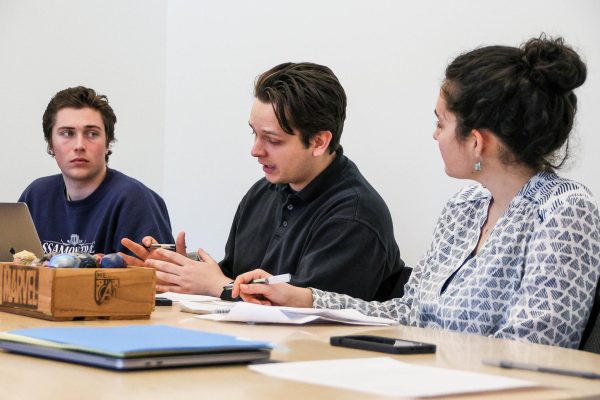
What is your plan to create affordable housing within UMass for the next couple of years? I know you talked about your more holistic approach.
Note: Reyes referenced experimenting with the Mount Ida campus and a program for freshmen to spend their first semester abroad as short-term solutions.
Well first, one of the things that we’re trying to [understand] is, ‘What’s the demand for housing over the next five to 10 years?’ We’re not projecting enrollment to grow substantially.
So I’m looking at an analysis of what are the needs, not only of new, but also of current housing that we have? What is the state of affairs for it? Understanding what are the things that our students want to see? The trick here is we want to make sure we offer all options that our students are looking for. We want to attract students and other universities are doing the same thing. How do you attract those students? To me, it’s not about having one type [of housing] that would give you everything, it’s about the options that students are looking for.
Can we get an understanding of what is the load or demand that we’re going to put on Amherst that is not being taken care of now? Or is it being taken care of now, and it’s just learning how to make sure that we do the offloading in a more organized fashion, working with off campus housing in a different way, to make it easier for our students to find the places where they can go live, and working with Hadley and the Amherst community about it.
Trying to map out where the students are, where the faculty and staff are, and then what are the means of transportation around them.
It’s going to take some time, but we want to make sure that we offer options, that we continue to focus on affordability for our students … that’s not an option, it has to be a focus.
Are public private partnerships the way that we want to explore more affordable housing? Financial experts suggest that you should only spend a third of your annual income on housing and the cheapest monthly rent for a bedroom in a Fieldstone apartment is $1,504 per month. A student would need to be earning $60,160 a year to afford one of these apartments.
Even though it may be at a higher price, [Fieldstone] will move some of the people that we have into that, and then it will free up some of the other options that we offer. So, it added capacity.
You talked about the public private partnerships. This was the first one we did. And I’m sure there’s a lot of learning that happened that, if we were to do some others, we would take into consideration.
[The demand for housing] is not something that is going to go away and better not go away, because it means that we’re getting less students… But how do we do it in a way that is affordable for our students, provides the options they’re looking for, allows us to recruit them, and then they want to be here? We do it in a way that it’s also financially sustainable, not only for the student, but also for the University.
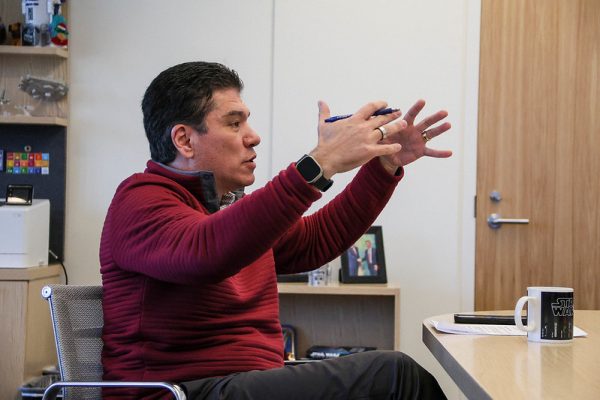
UMass has the goal of powering the campus with renewable energy by 2032. In the next few years what are the biggest infrastructure projects that the campus will be undertaking to meet this goal?
Note: Reyes noted that the upcoming computer science and engineering buildings will be carbon zero, utilizing geothermal energy, and that UMass is continually expanding electrical vehicles and solar power.
One thing we’re up against is what I call that dual race, you’re up against that race against technology, which continues to change. You want to make sure that you’re getting into technology that will be there to stay and there’s also a cost of implementing that technology.
And the 2032 goal is still attainable?
All we know is, that’s the goal.
There are only 12 universities that have announced the goal of carbon neutrality. Especially as a large university, what’s the message you’re hoping to send to other higher-ed institutions?
The message is, we all have to work on these environmental issues that we’re facing. And it starts with what we do every day. And [universities] are the ones who pump new individuals into society every year — 5,000 people go in, 5,000 go out — and how they go out, I think it’s important, right? Because we want [them] to be mindful leaders of what comes next.
After taking the reins from former Chancellor Subbaswamy, where did you see him excel and would like to do similarly? Conversely, what is something you would do differently than the former Chancellor?
Not being on the campus, I can only go by what I’ve heard and what I’ve seen. I think he was very thoughtful and consistent and I think we have that similarity.
I think I am a little bit more — perhaps my upbringing, perhaps having been in some different positions that require me to be more hands on — maybe I’ll be more hands on in some areas. That will be the difference.
I like to ask a lot of questions and when I go around and they ask questions my team will be like ‘Okay, where did you go now?’
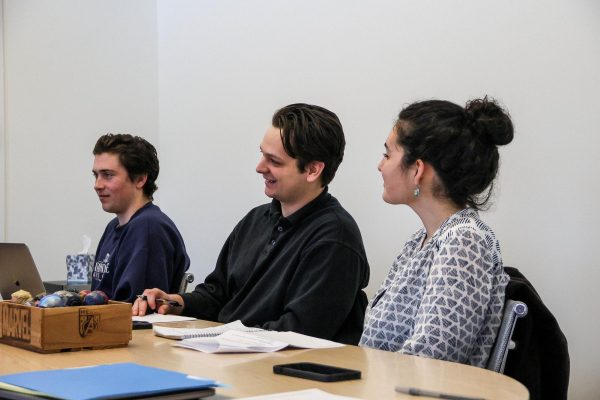
Have you read the Collegian before?
I read the one you [wrote about] Chancellor Subbaswamy, I read the one about the [arrested students] and I read ones about sports. I would like to see more about the researchers. What we do everyday on this campus is mind boggling … I would love to hear about what it means to the students to be at a university that is creating that kind of research environment. And then what I’m sure you’ll find is that behind every big researcher in this university, there’s a much better student researcher behind them actually working on this. But I did read a lot about the students, and I read a couple about football.
Anything you would like to say to the UMass community?
How grateful I am not only to the students, the faculty and the staff, but the whole institution, because I feel that I can be who I am in this job. I can have my Marvel toys here, my Star Wars toys, I can have my Star Wars socks on, I can talk about Star Wars, I can talk about the Marvel movies or music. I don’t feel like I have to hide it.
I’ve been very vocal [that] Chancellor Subbaswamy wore a tie more than I do. That will be something that we do different … It’s because when I was your age, and I was going through college, I had to wear a tie every day. Because I was working in an investment bank while going to college. And I’m telling [you] I was known as the tie guy.
So it’s the University that really lets me be myself. And I think it’s because people feel that they can be themselves here. And it really is something that you can notice immediately.
Lucas Ruud can be reached at [email protected].
Grace Fiori can be reached at [email protected].
Jack Underhill can be reached at [email protected].




